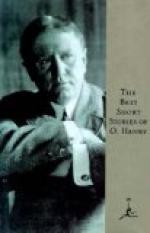“You’re right, Mac,” said Satan, treading in his excitement on a captain of Uhlans who was hanging out to cool; “that Kaiser is a regular prince of darkness. When he gets down here (and I guess he will pretty soon) we’ll omit the setting-up exercises and put him right into advanced tactics. Come to think of it, there were those prison camps, too, where he allowed captured soldiers to rot with filth and disease without any physicians. Excellent!”
“There’s only one drawback,” said Machiavelli regretfully. “The man has raised so much hell on earth that I doubt if there’s much we can teach him down here. Really, he’s not an amateur at all, but a professional. I don’t know whether it wouldn’t be more punishment to send him to heaven instead. As a matter of fact, down here he’ll feel perfectly at home.”
“I guess we can still think up one or two little novelties for him,” said Satan, as he opened a trap-door and let a dozen of Billy Sunday’s converts drop into the blazing sulphur.
IMMORTAL!
When Julia Ward Howe died, memorial services in her honor were held at San Francisco, and the local literary colony attended practically en masse to pay by their presence a tribute to the writer.
A municipal officer was asked to preside. Dressed in his long frock coat and his broad white tie, he advanced to the edge of the platform to launch the exercises and introduce the principal eulogist. He bowed low and spoke as follows:
“Your attendance here, ladies and gents, in such great numbers shows San Francisco’s appreciation of good literature. This meeting is a great testimonial to the immortal author of ’Uncle Tom’s Cabin’—the late Julia Ward Howard!”
ORIENTAL POLITENESS
William M. Chase used to tell this story:
“I was standing on a railway platform in Japan, waiting for a train, and whiling away my time by watching a particularly beautiful sunset.
“Suddenly a freight train pulled in and, stopping in front of me, cut off my view. Being a good American, and trained in a very proper respect for ‘business,’ I merely turned philosophically away and proceeded to look at something else. In a moment, however, the station master appeared at my side and inquired with the politest of bows if I had been enjoying the sunset.
“I admitted that I had, and smilingly accepted his apology for the intrusion of the train. ’Of course I recognized that trains were the first consideration in stations,’ I said.
“Imagine my surprise, then, when the little Japanese shook his head firmly. ‘But no,’ he said, bowing even more deeply than before, ’the train must not be allowed to obstruct the honorable artistic traveler’s honorable aesthetic enjoyment’—or words to that effect. ’I will cause it to withdraw,’
“And he actually did precisely that!”




